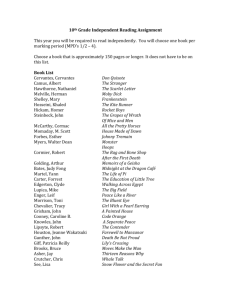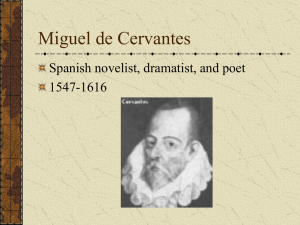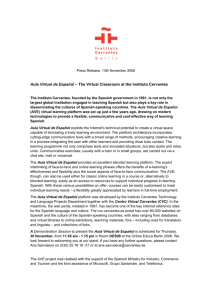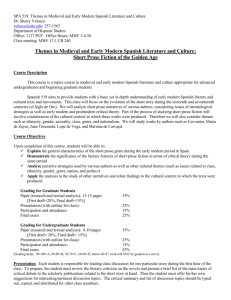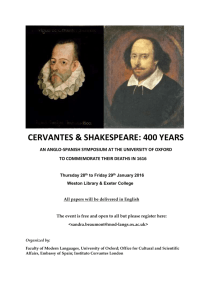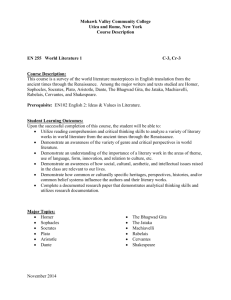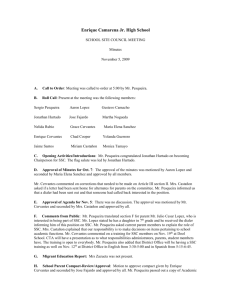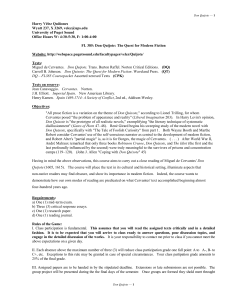A Globalized Cervantes - International Comparative Literature
advertisement
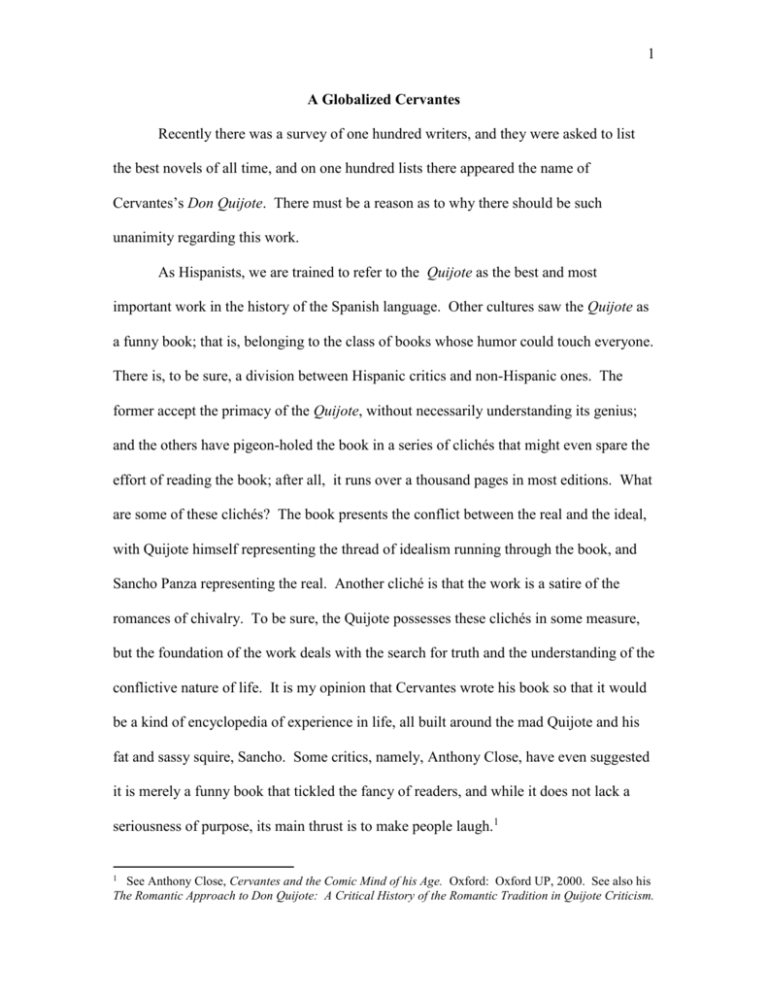
1 A Globalized Cervantes Recently there was a survey of one hundred writers, and they were asked to list the best novels of all time, and on one hundred lists there appeared the name of Cervantes’s Don Quijote. There must be a reason as to why there should be such unanimity regarding this work. As Hispanists, we are trained to refer to the Quijote as the best and most important work in the history of the Spanish language. Other cultures saw the Quijote as a funny book; that is, belonging to the class of books whose humor could touch everyone. There is, to be sure, a division between Hispanic critics and non-Hispanic ones. The former accept the primacy of the Quijote, without necessarily understanding its genius; and the others have pigeon-holed the book in a series of clichés that might even spare the effort of reading the book; after all, it runs over a thousand pages in most editions. What are some of these clichés? The book presents the conflict between the real and the ideal, with Quijote himself representing the thread of idealism running through the book, and Sancho Panza representing the real. Another cliché is that the work is a satire of the romances of chivalry. To be sure, the Quijote possesses these clichés in some measure, but the foundation of the work deals with the search for truth and the understanding of the conflictive nature of life. It is my opinion that Cervantes wrote his book so that it would be a kind of encyclopedia of experience in life, all built around the mad Quijote and his fat and sassy squire, Sancho. Some critics, namely, Anthony Close, have even suggested it is merely a funny book that tickled the fancy of readers, and while it does not lack a seriousness of purpose, its main thrust is to make people laugh.1 1 See Anthony Close, Cervantes and the Comic Mind of his Age. Oxford: Oxford UP, 2000. See also his The Romantic Approach to Don Quijote: A Critical History of the Romantic Tradition in Quijote Criticism. 2 I have a totally different point of view. For me, the Quijote is the greatest work of literature that depicts the conflictive aspects of life; not all laughs and not all tears, but something in between. But the purpose of my paper is to highlight Cervantes in a globalized manner. When we say “global” or “globalized,” we mean that there is a network of relations that go beyond the original work or the place with which that work is identified, in this case, Spain. Cervantes becomes an excellent example of an author that has touched the hearts and minds of people everywhere. His Don Quijote has been translated into almost every language I know of, and the name “Quixote” or “Quijote” has become assimilated into the English language as someone or something that is championing things that are seemingly impossible; hence, defiance of a law or an order becomes a “quixotic” act. “Quixotic” stays in the vocabulary in the same way that Machiavellian has, or McCarthyite, Wilsonian, or similar words. Such ingressions into the language can only occur in very special cases, and the case of Cervantes and Don Quijote is certainly one of them. In some ways, Don Quijote belongs to a folkloric category, that of the complex hero; someone for whom there is no easy answer to his life and ideas. On the one hand, the Italian philosopher and historian, Benedetto Croce, saw in Quijote a , simpatía, a positive quality that one sees and embraces immediately in someone.2 On first glance, our curiosity is piqued by this figure, who, to judge from the various descriptions we read of him, is more anti-hero than hero. You are not likely to see such a figure as the hero of Cambridge: Cambridge UP, 1978. See also P.E. Russell, “ ‘Don Quijote’ as a Funny Book,” Modern Language Review, 64 (1969): 312-326. 2 See his essay, “The ‘simpatía’ of Don Quijote,” Cervantes Across the Centuries. Eds. Flores, Angel and M.J. Benardete, N.Y.: Dryden, 1947, pp. 179-182. 3 a romantic novel or film. Visually, he is perhaps the least obviously heroic of characters, especially if one compares him with numerous heroes of chivalric romances. But what Croce saw in Quijote was a very human quality, a quality that attracted people because of some human virtue that was warm and gratifying. This quality of the anti-hero comes from the source of the first of the great antiheroic literary characters, Lazarillo de Tormes, goes beyond the merely folkloric. Don Quijote as a model, or a symbol, has appeared in numerous other artistic media: in the theater, as in Tennessee Williams’s Camino Real; or in the prints of Daumier and Gustav Doré; in a television play written by Alvin Sapinsly, or in Richard Strauss’s symphony; not to mention the enormously popular musical “Man of La Mancha.” All of these examples point to an importance granted to very few works of art, which have the possibility to engender other works of art in other languages and in other places. But there is another aspect to the work of this literary master, a historical one, and that is the historical environment from which he emerged and which formed him. The fifteenth century witnessed the end of Muslim power in Spain with the fall of the city of Granada. It also saw the formation of the first nation-state in Europe, consisting of the marriage of Castile with Aragon in the persons of Ferdinand and Isabel. Besides being the first nation-state in Europe, it signaled a new phase of politics and history, because Spain now branched out to all of Europe and indeed to the New World, initiating voyages to previously unknown places. The marriage of these two regions also signified the felicitous joining of a domestic politics with an international one. When King Ferdinand decided to have the columns of Hercules on the flag, he asked what else should be there, and a courtier whispered, “Plus Ultra, Sire,” and that is what the King 4 aimed at. Thusly, was born a political conception that embraced a new mode of governing. We see that the very notion of what we would call today “globalization” was born then. When Charles V became king of Spain, and later the head of the Holy Roman Empire, to the dismay of his rival, François I, he came to Spain unable to speak Spanish. He descended from the Habsburgs, and continued this thread of internationalism that was immanent in Spanish history. The armies of Charles I (his Spanish title) were spread all over Europe and in the New World. The troops were in Italy, France and reached Bohemia, to mention only a few places. Spain was truly the most powerful nation of Europe, and with its overseas possessions, seemingly the richest. But there was another aspect to this “pinnacle” of glory; it was all a sham. In a very early moment the stage is set for a rocky future in spite of some of the aura of the Isabeline and Fernandine union. In the short view, the notion of a modern state with a double perspective of a Castilian, Aragonese base and an expansionist foreign policy was so novel that the Catholic Kings could not predict what the downside of such a policy would be. The era of Charles V also presaged economic problems that would come to bitter fruition years later. Charles’s expansion on several continents called for a massive infusion of money to support such ventures. That many of these ventures were successful on its face no one can deny. Altamira says, “Almost the whole of the task of conquest was achieved during the reign of Charles I. Among the many who greatly distinguished themselves by their military achievements in carrying it out were Hernán Cortés, Pizarro, 5 Almagro, Valdivia, Alvarado, Montejo” (364).3 Altamira’s view is a momentary look at the brighter side of Charles V’s achievements. The consequences of such achievements become tarnished. Thinking of the case of Olivares, Elliott quotes Juan Pablo Mártir Rizo who said, “‘Empires are easily preserved with the customs they acquired at the start, and arrogance steps in where justice should prevail, then fortune and manners are changed, and empires are undone unless a remedy is found’” (51).4 Elliott goes on to say: “It was, therefore, the deviation from the guiding principles of the heroic age of greatness which was the true source of disaster. Like other societies, Castile had created an image of itself and of its past, which had helped to shape its expectations and its goals. The disappointments and reverses of the late sixteenth and early seventeenthy centuries created a crisis of confidence, because they implied that Castile was falling short of the goals--essentially military and religious--which had set itself. This failure was then set into the context of declination [emph. his],” (Elliott, Self, 51). Vilar focuses interestingly on this problem of the decline and Don Quijote when he says, “It has often been said that it would be fruitless to look to Cervantes for an interpretation of the ‘decadence’ of his country ‘because he could not have foreseen it.’ This is to misunderstand completely the chronology of events. For if the word ‘crisis’ really means the passage from rise to collapse, then it is certainly between 1598 and 1620, between its greatness and decadence, that we must locate the decisive crisis of Spanish power, the first great crisis 3 Altamira, Rafael. A History of Spain from the Beginnings to the Present Day. Transl. By Muna Lee. New York: Van Nostrand, 1949. 4 Elliot, J.H. “Self-Perception and Decline in Early Seventeenth-Century Spain,” Past and Present, 74 (Feb. 1977): 41-61. 6 of doubt of the Spanish people. Now the two parts of Don Quijote were published in 1605 and 1625” (100).5 There were other crises to be recognized in the sixteenth century. Thompson points out that “war contributed to a crisis of the social order which, while neither initiated nor resolved in this period was made more acute by the events of the 1590s” (III, 270).6 As I hope to show below, the sixteenth and seventeenth centuries in Spain were rife with crises of different kinds and some of which could not have not effected Cervantes’s life.7 Some historians are loathe to subscribe to the generally accepted notion of decadence, particularly Henry Kamen8 and Carla Rahn Phillips.9 If we turn to another of Cervantes’s creations, The Exemplary Novels [Las novelas ejemplares], we find that Cervantes’s interest in the larger world is greater perhaps than that of Don Quijote.10 In the short story “El Licenciado Vidriera,” [“The Glass Licenciate”], we have a character that loses his mind after eating a poisoned quince. He develops a mania that he is made of glass and becomes obsessed with being broken. Before his illness he had traveled about, especially Italy, and had visited various cities. He meets a gentleman that was a captain of infantry who speaks of various aspects and characteristics of the cities Vilar, Pierre. “The Age of Don Quijote,” in Peter Earle, ed. Essays in European Economic History, 1500-1800. Oxford: Clarendon, 1974. 6 Thompson, I.A.A. War and Society in Habsburg Spain. Aldershot, Hamphshire: Variorum, 1992. 7 I accept a priori that a novelist, any artist, is molded by the environment, intellectual or artistic. There are rare exceptions to this rule, but for me, Cervantes is affected by the circumstances of his time. 8 Kamen, Henry. “The Decline of Spain: A Historical Myth?,” Past and Present: 81 (Nov. 1978): 2450. 9 Phillips, Carla Rahn. “Time and Duration: A Model Economy of Early Modern Spain,” The American Historical Review. 92, #3 (June 1987): 531-562. 10 See Ricapito, Joseph V. Cervantes’s Novelas ejemplares: Between History and Creativity. West Lafayette, IN.: Purdue UP, 1996. 5 7 and countries that he visits, and saw the importance and usefulness of travel because it broadened a person’s mind.11 “Alabó la vida de la soldadesca; pintóle muy al vivo la belleza de la ciudad de Nápoles, las holguras de Palermo, la abundancia de Milán, los festines de Lombardía, las espléndidas comidas de las hosterías; dibujóle dulce y puntualmente el aconcha, patrón; pasa acá, manigoldo; venga la macarela, li polastri, y li macarroni. Puso las alabanzas en el cielo de la vida libre del soldado y de la libertad de Italia” (vol. 2, p. 45, Novelas ejemplares,ed. Harry Sieber). [“The gentleman stated that he was a captain of infantry in the service of His Majesty, and that his ensign was at that moment engaged in recruiting a company in the neighborhood of Salamanca. He went on to praise the life of the soldier, giving a vivid description of the beauty of Naples, the merrymakings of Palermo, the abundance of good things to be found in Milan, the feastings of Lombardy, and the splendid meals to be had in the hostelries. He politely and carefully explained the meaning of such expressions as ‘Aconcha, patrón; passa acá, manigoldo; venga la macarela, li polastri e li macarroni” (translation, “Man of Glass,” p. 79, Putnam). This description of Italy comes from Cervantes’s own experiences of being in Italy after his service as a page with Cardinal Acquaviva, and reveals the extent to which he had been involved in Italy and in Italian life. Later Tomás Rodaja goes to Italy and the text reads, “Allí conocieron la suavidad del Treviano, el valor del Montefrascón, la fuerza del Asperino, la generosidad de los dos griegos Candía y Soma, la grandeza del de las Cinco Viñas, la dulzura y apacibilidad de “…sería bueno ver a Italia y Flandes y otras diversas tierras y países, pues las luengas peregrinaciones hacen a los hombres discretos” (Sieber, vol. II. Las Novelas ejemplares, p. 46). The narrator notes that Rodaja is invited by Captain Valdivia to see Italy. Putnam, the translator, says “it would be a very good thing to have a glimpse of Italy and Flanders and various other lands and countries, since long journeys of this sort made men wise.” [Three Exemplary Novels, transl. Samuel Putnam, p. 80]. 11 8 la señora Guarnacha, la rusticidad de la Chéntola, sin que entre todos estos señores osase parecer la bajeza del Romanesco” (Sieber, Novelas ejemplares, 49.) [“It was then they came to know the smooth taste of Trebbiano, the full body of Montefiascone, the sharp tang of Asprino, the hearty flavor of those two Greek wines, “Candia and Soma, the strength of Five Vineyards, the sweetness and charm of Lady Vernaccia, and the rude bite of Centola, all of which were such lordly vintages that the lowly Romanesco did not care to show its face among them” [p. 82, Putnam]. In another story “La española inglesa,” [“The Spanish Englishwoman”], we see how Cervantes engages in a genuine concern for the welfare of Catholics in England. Isabel is kidnapped and raised in England, and secretly brought up according to Catholic doctrines. The plot is played against the background of the hostilities of the Elizabethan rule against the Catholics. But Cervantes develops the love motif in the manner of the Greek novel. I believe that Cervantes really is using the background of the Tudor/Elizabethan conflict as a mask for the problematic lives of conversos in Spain. Suffice it to say that Cervantes brings this historical and religious question into the substance of the story and it displays his knowledge of a wider sense of awareness of the history of his time, and not necessarily limited to Spain. However, in the story “La señora Cornelia” [“Lady Cornelia”] Cervantes deals with a question of honor in which the conflict of the story is placed against a backdrop of Italy. Jean Canavaggio, an authoritative critic of Cervantes’s work, made a reference that displays the reversable borrowings between Cervantes and Italian literature: “Le Décaméron de Boccacce, et son extraordinaire variété de personnages et de situations: si l’auteur des Nouvelles exemplaires n’en a pas repris telle quelle la manière, il en a 9 cependant retenu la leçon; sans sacrifier sa propre originalité, il en transposera si heureusement la formule que ses contemporains le surnommeront ‘le Boccacce Espagnol’”.12 As part of the plot there are two Spanish noblemen that are studying in Bologna, and the two main characters bear Italian names, Cornelia Bentivoglio and Alfonso d’Este. Here one must recall Benedetto Croce’s excellent work, which studies Spanish life in the Italian peninsula. Croce points out that the Spanish occupation of Italy was extensive and many Spanish noblemen carried out important military and diplomatic charges there. 13 So that we can say Italy becomes yet another example of itself as the background for the story. However, with due respect to Cervantes, he develops the theme of the story in such a way that the piety of the Spaniards plays an important part in their characterization, and an additional touch of Cervantes is to present the two Spanish noblemen in a good light (see Croce for some of the negative characteristics associated with Spaniards).14 While the major plot, which deals with restoring Cornelia’s honor, is dealt with, en passant, he manages to have the reader end with a very positive sense of the Spaniards. Cervantes’s association with other countries and other cultures can be found in other works of his. For instance, in Don Quijote, there is the interpolated novel of “El curioso impertinente,” [The Story of the Ill-Advised Curiosity] taken from an Italian short story source, and the episode of the Captive, El cautivo. In the latter, Cervantes avails himself of his own adventures in jail in Algiers. In that episode, there is narrated all the experiences a person could have in such a circumstance. Cervantes describes the 12 13 14 Canavaggio, Jean. Cervantès. Paris: Mazarines, 1986, pp. 79-80. Croce, Benedetto: La Spagna nella vita italiana durante la Rinascenza. Bari: Laterza, 1949. Ibid., La Spagna…. 10 various kinds of Moors that were there and some of their customs. This episode is an excellent example of Cervantes’s consciousness, how his own experiences mold the subject matter and the extent to which Cervantes is willing to create fiction that has such a strong tie with the experiences he had in that jail experience. In typical Cervantine fashion, the material of this episode is subjected to irony and benevolent humor at the same time. There are numerous events where the reader realizes that Cervantes is relating material tongue-in-cheek. The Captive attracts the attention of a notable Moor, who has a beautiful daughter who falls in love with him. They exchange letters, but her letters are in Arabic, which the prisoner does not know and he must avail himself of a translator, which brings the reader into the game that Cervantes plays regarding truth. How much truth will something have if it passes through several persons? Will there not be a slip of some kind? Aside from the “seeking-the-truth game” that Cervantes is constantly playing on his reader, there is a question of loyalty to one’s culture and religion. One must not forget that these are pre-ecumenical times, and the relations between the religions were very hostile, therefore, Cervantes treats a very sensitive subject, because Zoraida, the daughter of the Moor, has secretly converted to Christianity. There are a number of consciousness devices that we see at work in the Cautivo episode. We have mentioned the importance of memory (Cervantes’s own experiences as a prisoner in Algiers) in the episode. Memory is what allows us to encapsulate our experiences. By means of memory we make our connections to the past through our positioning in the present. Memory not only affirms our existence in the past but also our presentness, our “in-the-world-at-the moment-ness.” 11 Another feature of consciousness is the question of existential choice. The prisoner has made his choices, and Zoraida makes the choice to be a Christian. But Cervantes does not limit this question only to a religious or political choice. He acknowledges that his characters do this, but he also endeavors to reveal the human consequences of choice. In this case, it becomes the reaction of Zoraida’s father to her conversion to Christianity. The daughter subsequently decides to abandon her father and the land of her birth. Zoraida exerts her wish for freedom from her Arabic background by “marrying,” verbally of course, a Christian captive. There are two parts to this choice. In the first, she is willing to give everything up by choosing the Christian life. Again, within an existential and phenomenological perspective she is gambling with her choice. As it turns out, she will lose her father’s wealth. An Italian saying is that one cannot have two paradises. Zoraida has lost the money but she still has the freedom, and it has not been without significant sacrifice and cost. The second phase of her choice deals with her father in a personal way. Zoraida’s choice to be a Christian means the rejection and abandonment of her family and her culture. It was possible that Cervantes was faced with highlighting Zoraida’s departure as a change of Gods, so to speak, and he could have had a smooth transition from one life to another. But he adds a human dimension that to me is crucial to his handling of this episode. Yes, it is true that since she was a child she wanted to be a Christian, and it is true that she falls in love with a handsome (one assumes) Christian who will be the means of achieving this end. But Cervantes shows that her choice is not one-sided; that is, he shows the full effects her choice has on her father. It is in the scene in the boat which is used to escape to Spain where the 12 daughter and father display their deepest emotions. The Captive states that after Zoraida’s father was fished out of the water—he tried to commit suicide by throwing himself overboard—Zoraida “hacía sobre él un tierno y doloroso llanto.” [And so distressed was Zoraida that she burst into a tender and sorrowful lament over him.] When her father regains his composure, he says accusingly: “—¿Por qué pensáis, cristianos, que esta mala hembra huelga de que me deis libertad? ¿Pensáis que es por piedad que me tiene? No, por cierto, sino que lo hace por el estorbo que le dará mi presencia cuando quiera poner en ejecución sus malos deseos; ni penséis que la ha movido a mudar religión entender ella que la vuestra a la nuestra se aventaja, sino el saber que en vuestra tierra se usa la deshonestidad más libremente que en la nuestra.” Y volviéndose a Zoraida, teniéndole yo y otro cristiano de entrambos brazos asido, porque algún desatino no hiciese, le dijo: --¡Oh infame moza y mal aconsejada muchacha! ¿Adónde vas, ciega y desatinada, en poder destos perros, naturales enemigos nuestros? ¡Maldita sea la hora en que yo te engendré, y malditos sean los regalos y deleites en que te he criado.” Pero viendo yo que llevaba término de no acabar tan presto, di priesa a ponelle en tierra, y desde allí, a voces, prosiguió en sus maldiciones y lamentos, rogando a Mahoma rogase a Alá que nos destruyese, confundiese y acabase; y cuando, por habernos hecho a la vela, no podimos oír sus palabras, vimos sus obras, que eran arrancarse las barbas, mesarse los cabellos y arrastrarse por el suelo; mas una vez esforzó la voz de tal manera, que podimos entender que decía: “--¡Vuelve, amada hija, vuelve a tierra, que todo te lo perdono; entrega a esos hombres ese dinero, que ya es suyo, y vuelve a consolar a este triste padre tuyo, que en esta desierta arena dejará la vida, si tu le dejas!” Todo lo cual 13 escuchaba Zoraida, y todo lo sentía y lloraba, y no supo decirle ni respondelle palabra, sino: “—Plega a Alá, padre mío, que Lela Marién [the Virgin Mary], que ha sido la causa de que yo sea cristiana, ella te consuele en tu tristeza. Alá sabe bien que no pude hacer otra cosa de la que he hecho, y que estos cristianos no deben nada a mi voluntad, pues aunque quisiera no venir con ellos y quedarme en mi casa, me fuera imposible, según la priesa que me daba mi alma a poner por obra esta que a mí me parece tan buena como tú, padre amado, la juzgas por mala” (Don Quijote, ed. of J.J. Allen, pp. 483484).15 [“ ‘Why do you think, Christians,’ he said, ‘that this wicked woman rejoices at your giving me my liberty? Do you think it is because of her affection for me? Not so. It is only because my presence hinders the execution of her base designs. And do not imagine that she has changed her religion because she believes that yours is better than ours. Then he turned to Zoraida, while I and another Christian held him fast by both arms, to prevent his doing some mad act. “ ‘Infamous, misguided girl, he said to her, where in your blindness and madness are you going in the hands of these dogs, our natural enemies? Cursed be the hour when I begot you! Cursed the luxury and indulgence in which I reared you!’ “Seeing that he was likely to go on for some time, we made haste to put him on shore, where he continued his maledictions and loud lamentations. He called on Mohammed to pray to Allah to destroy us, to confound us, to make an end of us. When we had made sail and could no longer hear what he said, we could see what he did, how he pulled out his beard and tore his hair, and lay writhing on the ground. But once he raised his voice to such a pitch that we were able to hear what he said. ‘Come back, dear daughter—come back to shore, I forgive you everything. Let those men have the money, for it is theirs now, and come back to comfort your sorrowing 15 Cervantes, Miguel de. Don Quijote de la Mancha, vol. I. Ed. de J.J. Allen. Madrid: Cátedra, 1977. 14 father, who will yield up his life on this barren strand if you abandon him.’ “All this Zoraida heard, and heard with sorrow and tears. ‘Allah grant’-- this was all she could say in answer-- ‘that Lela Marién, who has made me become a Christian, give you comfort in your sorrow, O my father. Allah knows that I could not do otherwise than I have done, and that these Christians bear no responsibility. Even had I wished not to accompany them but to remain at home, I could not have done so, so eagerly did my soul urge me on. This purpose appears no less noble in my eyes than in yours, dear father, it seems wicked.’ [translation Jones and Douglas, 329-330].16 And so it is that Cervantes breaks through various barriers, literary, political, religious and many others, in the creation of his Don Quijote. But he never forgot that behind all the rhetoric, there were human strivings and human tragedies. Cervantes is the master globalizer because he is willing to reach out to other traditions, other countries, and in the process has created one of the greatest pieces of literature that the world has ever known. Joseph V. Ricapito Louisiana State University, Baton Rouge, USA 16 Cervantes, Miguel de. Don Quijote. Translators, Joseph R. Jones and Kenneth Douglas. New York: Norton, 1981, pp. 329-330.
